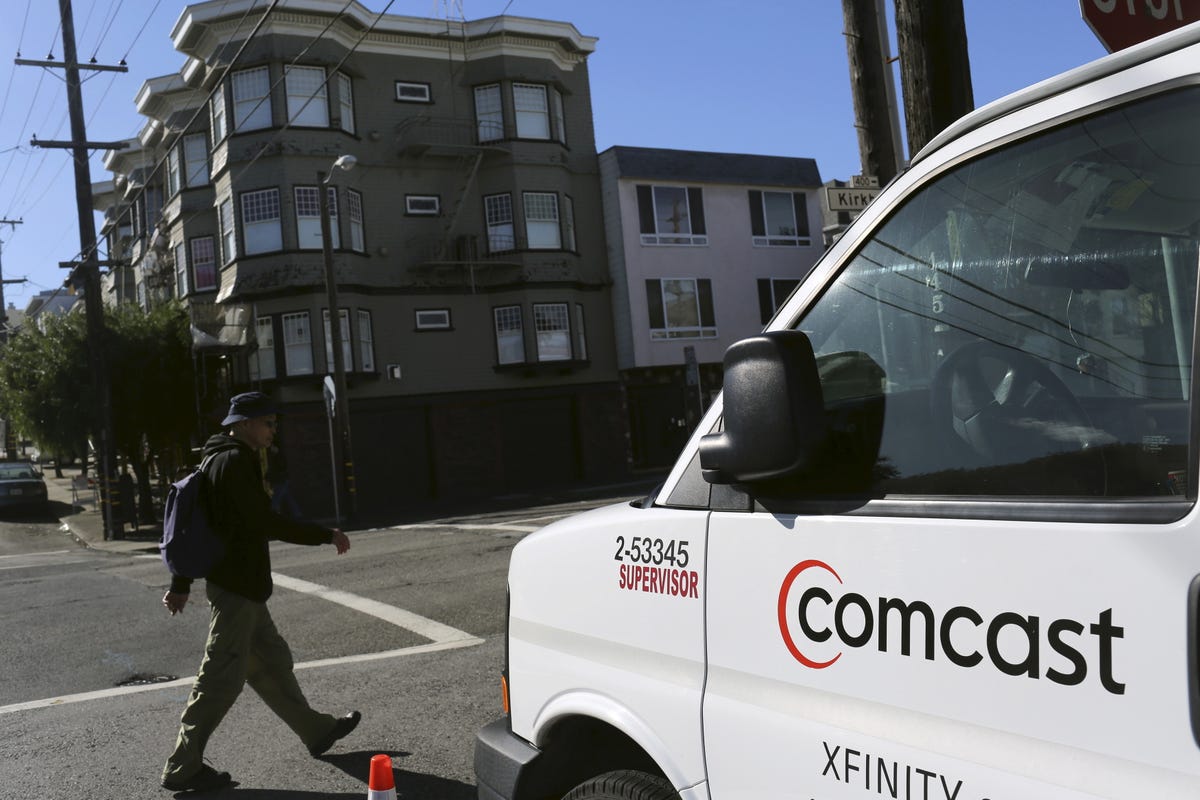CNET's 2015 tech turkeys (pictures)
These were some of the biggest embarrassments and snafus in the tech world in the year gone by. How many had a personal impact on you?

Comcast goes blue
Here's a good rule for customer service: Don't use an expletive when dealing with the people you're supposed to be helping. Here's how that rule got shattered: In January, a Comcast employee used one to replace a customer's name on a cable bill.
This was no innocent typo. Philadelphia-based Comcast quickly apologized and said it would make things right with the customer.
Samsung still can't do software
Remember Milk, the little-used media services from Samsung Electronics? Probably not, and that's part of the reason the South Korean phone giant shuttered Milk Video and can't get many people to listen to Milk Music.
Milk wasn't Samsung's only software spill. Consider the fizzle that was Tizen, homebrewed software that was supposed to be an alternative to Google's Android mobile software.
Sure, Samsung can make a beautiful phone, but it doesn't seem to have the chops to make anything that takes advantage of the hardware.
What's going on with HTC?
One company that couldn't get out of its own way was HTC. Its flagship smartphone, the HTC One M9, did little to improve on its predecessor and quickly flopped.
The Taiwanese company hoped to bring its design expertise into new areas of technology by partnering with apparel maker Under Armour on a fitness band and with video game specialist Valve on a virtual-reality headset. That was a great idea, except the fitness band was scrapped this year, and HTC this year will only sell limited numbers of its VR headset, the Vive.
It's also telling when the most interesting product from a smartphone maker isn't a smartphone.
Apparently, people can get enough of 'Steve Jobs'
Bringing together the award-winning scribe behind Facebook-focused "The Social Network," the Oscar-winning director of "Slumdog Millionaire" and actor Michael Fassbender of X-Men fame could have led to a blockbuster biopic of Apple co-founder Steve Jobs.
It didn't.
"Steve Jobs" was unceremoniously pulled from theaters just three weeks after it debuted. The movie was so unloved it barely edged out "Jobs," Ashton Kutcher's 2013 flop at the box office. ("Steve Jobs" grossed $17.5 million compared with $16.1 million for "Jobs.")
Here's our take on it.
Peeple, the most 'hated app'
The Peeple app was designed to let you rate people as you might rate a restaurant on Yelp.
Let that sink in for a minute. Are you starting to see the terrible psychological, moral and even legal implications?
So did everyone else. The backlash was so fierce that Peeple was dubbed the "Internet's most hated app" at one point. That's amazing given the app was never released.
Peeple's creators argue their app was intended to "spread positivity" and are busy making changes. We still think it's a turkey on principle.
Yeah, BlackBerry is still around
Making a "triumphant" return to the tech turkeys is BlackBerry, which was absent last year as CEO John Chen busied himself transforming the company from a smartphone maker to one focused on software and services.
But BlackBerry can't seem to quit smartphones yet, even if its BlackBerry 10 software is proving to be the real turkey. The company's attempts at selling devices like the squat Passport and the Bold-like Classic petered out with little support from carriers and even less interest from consumers. In the last quarter, it sold 800,000 smartphones, or less than half its total from a year earlier.
The company made the hop to Android with its latest smartphone, the Priv, but that leaves us to wonder how much longer it will support its own software.
Tidal wave more like a puddle
No tech event this year featured as much star power as the splashy launch of Tidal, Jay-Z's music service. It was billed as an artist-owned alternative to Spotify, with a monthly $20 subscription nabbing you high-quality audio streams. Kanye West, Rihanna and Madonna tweeted about the service on launch day.
It turns out, nobody cares that artists make more money off Tidal than Spotify. In fact, nobody seemed to care about Tidal.
Apple Music strikes the wrong chord
Apple found itself on the defensive when Taylor Swift pulled her album "1989" from the tech giant's new streaming service, Apple Music. Her complaint: Apple said it wouldn't pay artists during a three-month trial period.
Apple quickly capitulated, but that didn't put an end to its problems. Critics complained about Apple Music's complicated user interface and its occasional tendency to erase songs in existing customer catalogs.
Despite the rough start, Apple says it had at least 6.5 million paying customers as of October and is happy with customer response to the service.
Reddit revolt
The self-billed "front page of the Internet" faced the Internet's wrath when the community-curated news site banned several forums, known as "subreddits," saying they fostered homophobia, racism and fat-shaming. Critics also bashed Reddit for abruptly firing its director of talent, who oversaw the popular "Ask Me Anything" subreddit.
The moderators who maintain the subreddits revolted and shut down dozens of forums. Eventually, Ellen Pao, the interim CEO, was forced to exit.
Yes, diversity is still a problem
Ellen Pao also lost a sex discrimination lawsuit against venture capital firm Kleiner Perkins Caufield & Byers, her former employer. The legal battle became synonymous with gender inequality in Silicon Valley, where all the best jobs seem to go to white men.
As CNET explored in its "Solving for XX" special report, women hold far fewer leadership positions in the heart of technology. Many observers see that lack of diversity as potentially handicapping the tech industry's ability to innovate.
Discrimination against women has been particularly prevalent in the gaming industry, where harassment of women who speak out about sexism has led to death threats. Organizers of the South by Southwest media-and-tech festival had planned to discuss the issue but backed out amid concerns over safety. The about-face prompted complaints from panelists, women's rights groups, Vox Media and Buzzfeed. Eventually the organizers rescheduled the discussion.
Twitter's 2015: #meh
Twitter's year was almost entirely consumed by speculation over who would run the popular-but-struggling micro-blogging service after CEO Dick Costolo was bounced. After months of dithering, Jack Dorsey, a former CEO and co-founder, was brought back for a second act.
The site is still dogged by complaints that it's too complicated to use. ("My mother still doesn't understand what it means to 'hashtag' something," cracked one analyst who covers the company.) And its reputation was dinged when a former high-level black employee lashed out at the company for failing to hire Hispanic, black and female engineers.
Try getting all of that into one of Twitter's 140-character messages.
Airbnb goes tone-deaf
Call it hubris, poor taste or just plain old stupidity, but Airbnb managed to get under San Francisco's skin with ads suggesting how the city could spend the $12 million a year the home-sharing service ponies up. Some wags thanked the company for paying its taxes, just like everyone else.
As the backlash built, Airbnb executives felt the need to apologize and CEO Brian Chesky sent a memo to employees saying leadership had failed both employees and the community. Too late, the damage was already done.
Uber's headaches keep pounding
Didn't think it could get worse for Uber than in 2014, when the ride-hailing service picked a fight with a competitor and suggested it might try to discredit reporters? It did.
This year, Uber was hit with a lawsuit alleging it didn't screen drivers thoroughly enough to prevent sexual assaults. The company's own drivers filed a separate legal action that pushes for them to be designated as employees rather than contract workers.
The legal maneuverings come against a backdrop of Uber's other well-known problems. Those include pushback from cities and local taxi associations, which complain Uber isn't playing by the rules.
Tinder CEO needs a dictionary, stat
Sean Rad, the head of dating app Tinder, gave what may the most spectacularly bad CEO interview ever. It's also among the worst timed.
Speaking with London's Standard newspaper, Rad attempted to make the argument that his service, which lets users swipe left or right to indicate whether they find a photo of a potential date appealing, is designed for love connections. To prove his point, Rad stated he was less concerned with superficial traits than in making an intellectual connection.
We'll let Rad explain from here...
"Apparently there's a term for someone who gets turned on by intellectual stuff," he told the Standard. "I want to say, sodomy?"
Rad, who most likely meant sapiosexual, made the comments the day before parent company, Match Group, was set to debut as a public company. It caused such a stir that Match Group disavowed Rad's comments and the article in a filing with the Securities and Exchange Commission.
Ashley Madison's meltdown
Ashley Madison's troubles began when hackers posted a list of 30 million customers of the adultery-minded social network. The data exposure alone was embarrassing, but the breach was worse for Ashley Madison, drawing attention to speculation the site had created fake profiles, or "fembots," to entice its mostly male clientele.
Noel Biderman, CEO of parent company Avid Life Media, resigned shortly afterward. Still, Avid said about a month after the hack was revealed that it was adding hundreds of thousands of new users.
Maybe they were robots?
Volkswagen caught red-handed
Volkswagen is learning a very hard lesson. The US Environmental Protection Agency accused the world's largest automaker by volume of programming software in its diesel cars so it appeared that their emissions were cleaner than they actually were. That has spiraled into a disaster.
The revelation caused Volkswagen to issue one of the largest car recalls ever, covering roughly 11 million vehicles, with potentially more to come. One Wall Street firm has pegged the cost of the recall at $86 billion, far higher than the $7.3 billion the company had set aside.

Our sense of security? Gone like the first serving of potatoes and gravy
We're doomed.
Look around. Chances are, you or someone near you has been affected by one of the scores of hacks this year.
The numbers are scary big. Anthem, the second-largest health insurer in the US, said hackers had stolen the information of 80 million current and former members and employees. That hack alone represents a quarter of the US population.
Sadly, it wasn't the only incident. The US government's Office of Personnel Management lost 22 million Social Security numbers. Experian, which runs credit checks for T-Mobile, lost personal information of 15 million customers. United Airlines reportedly suffered a breach that saw hackers swipe flight manifests.
Even LastPass, a company whose sole purpose is to store and protect your passwords, got hacked. LastPass said most of its users were safe, but confidence was shaken so badly it had to sell itself to LogMeIn just a few months later.
So what does that all mean? A healthy dose of paranoia may not only be acceptable, but even recommended.
Enjoy your pie!

